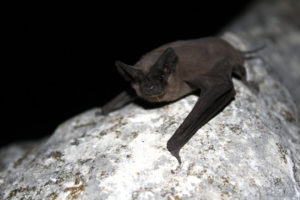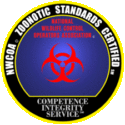Bats are the subject of old horror movies, popular as a Halloween decoration, and are often referred to as “blind.” Never touch a bat, even if it is dead.
ALL SPECIES OF BATS ARE PROTECTED IN THE STATE OF CALIFORNIA and are listed as SPECIES OF SPECIAL CONCERN. More information HERE

Bats are a wonderful and beneficial member of the mammal family, and are the only mammals with wings. Taking to the desert skies at night, they consume insects, pollinate plants and disburse plant seed. Worldwide, there are over 1,100 species of bats. 40 of those species are found in the United States, and California is home to more than 25 of those species.
While bats do use caves and old mines in which to live, some desert species tend to live in cracks and crevices in-between large rocks, under tree bark, etc., while others live in trees. They drink while flying just above water sources, skimming the surface. Many species will eat their own weight in insects every night.
Sometimes bats choose to roost and raise young in places they aren’t meant to be. An unsecured attic is a popular choice. Should bats choose an attic, they can cause a of damage, and deposit large amounts of guano (bat feces.) Bat guano often contains micro organisms that can make people sick. Bats may also be carriers of Rabies.
Sometimes a bat will fly in through an open window, entering the living area of a home.
It is very important, in either circumstance, to enlist the services of a trained wildlife control professional-and never an exterminator, for humane and safe bat removal. Some pest control operators use unscrupulous practices-sometimes killing entire colonies of bats, which is illegal.
Be certain you are consulting with a licensed wildlife control operator, one who is trained in the humane techniques used in removing bats from your home, warehouse, or other enclosed areas.
FGC § 2118 (b)
It is unlawful to import, transport, possess, or release alive into this state, except under a revocable, nontransferable permit as provided in this chapter and the regulations pertaining thereto, any wild animal of the following species: Order Chiroptera (bats): All species.
 |  |  |  |  |
|---|
 |  |  |  |  |  |
|---|
 Donna C.
Donna C. I called HD Wildlife for squirrels and they came out took care of all the active holes. Unfortunately there were so many squirrels they came up in same holes. They guarantee for 24 hours and they came out again no charge. They suggested I talk to my neighbors to see if they would consider the service to just keep them from running from property to property. I did talk to them so we will see if they will call them. I also learned a lot about these squirrels, one they are not native to California someone brought them here at some time. Very knowledgeable!
I called HD Wildlife for squirrels and they came out took care of all the active holes. Unfortunately there were so many squirrels they came up in same holes. They guarantee for 24 hours and they came out again no charge. They suggested I talk to my neighbors to see if they would consider the service to just keep them from running from property to property. I did talk to them so we will see if they will call them. I also learned a lot about these squirrels, one they are not native to California someone brought them here at some time. Very knowledgeable!
I highly recommend High Desert Wildlife for any removal of wildlife! Great people!read moreread less Laurence M.I had great communication and response time. Very personable and caring company. Our technician Robert was very respectful and efficient. I could tell he was a solid dude who cared. I highly recommend their services!read moreread lessBrooklyn B.Super friendly and responded very quickly! We called for a snake removal after closing hours and a member arrived within half an hour. She was very professional and informative about the type of snake and where it would be sent. Great experience.read moreread less
Laurence M.I had great communication and response time. Very personable and caring company. Our technician Robert was very respectful and efficient. I could tell he was a solid dude who cared. I highly recommend their services!read moreread lessBrooklyn B.Super friendly and responded very quickly! We called for a snake removal after closing hours and a member arrived within half an hour. She was very professional and informative about the type of snake and where it would be sent. Great experience.read moreread less Jessie C.
Jessie C. Wow! These guys are so wonderful! We had a raven fledgling in our backyard for a few weeks now. We were giving it healthy snacks and water because it didn't seem to be able to fly, but keeping our distance. It honestly was a nice bird but yesterday we came home to find garden mesh wrapped around it's feet. We couldn't rest knowing he could possibly lose circulation of his feet or just felt trapped. I did a quick online search and called the High Desert Wildlife Control. I honestly felt hopeless because I called fairly late in the evening, but they answered! They quoted me a fair price and dispatched someone who came within an hour. We were so amazed at how gently Robert captured our raven with a towel and quickly cut away the mesh from his feet. He confirmed he was unharmed and released him. We will miss our raven baby, but we are simply in awe with how gentle and professional Robert was. They are a godsend. Thanks so much for everything guys and as animal lovers we truly appreciated how humane the process was! read moreread less
Wow! These guys are so wonderful! We had a raven fledgling in our backyard for a few weeks now. We were giving it healthy snacks and water because it didn't seem to be able to fly, but keeping our distance. It honestly was a nice bird but yesterday we came home to find garden mesh wrapped around it's feet. We couldn't rest knowing he could possibly lose circulation of his feet or just felt trapped. I did a quick online search and called the High Desert Wildlife Control. I honestly felt hopeless because I called fairly late in the evening, but they answered! They quoted me a fair price and dispatched someone who came within an hour. We were so amazed at how gently Robert captured our raven with a towel and quickly cut away the mesh from his feet. He confirmed he was unharmed and released him. We will miss our raven baby, but we are simply in awe with how gentle and professional Robert was. They are a godsend. Thanks so much for everything guys and as animal lovers we truly appreciated how humane the process was! read moreread less Janine G.Professional, friendly, and honest!! What more could you ask for? I thought I had a ground squirrel infestation. I see squirrels on my 2.5 acres on a regular basis, so when I started seeing small mounds everywhere, and holes near the base of my home, I assumed squirrels were tunneling under the house. I made an appointment with Annie to come out and exterminate them before they damaged the foundation of my home. As it turns out, there were a couple of areas near the house that harbored the squirrels, but none under the foundation. Annie was able to identify the critters who were making these mounds and holes. Thankfully, they don't cause the kind of destruction that ground squirrels can cause, which saved me tons of stress and money!!! If you need the type of services they offer, then don't hesitate calling HD Wildlife Control. You'll be glad you did.read moreread lessJanine C.Annie, you're the best!! Thank you so much for coming out and helping us with our squirrel problems. You gave me peace of mind and loads of education. I loved listening to all the helpful information you had to share.
Janine G.Professional, friendly, and honest!! What more could you ask for? I thought I had a ground squirrel infestation. I see squirrels on my 2.5 acres on a regular basis, so when I started seeing small mounds everywhere, and holes near the base of my home, I assumed squirrels were tunneling under the house. I made an appointment with Annie to come out and exterminate them before they damaged the foundation of my home. As it turns out, there were a couple of areas near the house that harbored the squirrels, but none under the foundation. Annie was able to identify the critters who were making these mounds and holes. Thankfully, they don't cause the kind of destruction that ground squirrels can cause, which saved me tons of stress and money!!! If you need the type of services they offer, then don't hesitate calling HD Wildlife Control. You'll be glad you did.read moreread lessJanine C.Annie, you're the best!! Thank you so much for coming out and helping us with our squirrel problems. You gave me peace of mind and loads of education. I loved listening to all the helpful information you had to share.
I really enjoyed talking with you! You're a fun and very kind lady. Thank you, and we'll be seeing you again soon!read moreread less- brianAbsolutely the best you'll find!read moreread lessAngela C.We have been doing battle with squirrels for several years. We tried everything. They were digging holes everywhere, and were eating the bark off of our fruit trees! We finally gave up trying when our mare fell into one of the holes and hurt her leg. If you have squirrels, hire these fine people! They worked very hard, and did an amazing job. From the first phone contact to the end of the job, they were accommodating, very friendly, and were so mindful and kind to our animals! They found two gopher snakes while they were working, and let them go after they finished. A+! If a company deserves a motto, this one should be "we know squirrels." Thank you Annie and your crew, you are dedicated people!read moreread lessAndrew J.Excellent knowledge of both domestic animals/ livestock predation, invasive species invasions and control / prevention, identification of problem areas / treatment of them, methods of denial to a space / exclusion. I've worked with Annie in the field on multiple occasions and together we came up with multiple plans to deal with what we were facing with the help of multiple agencies within our county. I would highly recommend Annie for domestic animal exclusion/ control, wildlife control / relocation, injured wildlife(she has direct contacts with and is licensed through Ca Dept of fish and game and more). She is one of the few licensed "animal trappers" in the area that can legally deploy a chemical immobilization technique for capture.read moreread less
- Joe T.I have collaborated with High Desert Wildlife Control on a number of projects for the National Wildlife Control Operators Association. Their team has been valuable to the association and I’ve seen their staff provide ample time with other operators around the country, sharing their insight and experience. If I lived in the rough deserts of California (lol), I’d be honored to be one of their customers. A brief call to their company to share your wildlife issue will convince you of the same. Joe Taylor, owner | Paw Control Wildlife Solutionsread moreread lessTyler B.Thank you Annie for coming out yesterday to Oak Hills and taking this little one off our hands.read moreread less
 V H.
V H. Annie and her team are very professional and efficient. I had so many squirrel colonies living on about an acre for 12 years, but when the squirrels decided to go under my houses, I was done. I immediately called High Desert Wildlife Control and Annie got me scheduled ASAP. It took 2 visits and WOW! It is so nice to go outside and not see squirrels foraging or hear squirrels chirping for hours on end. The cost is very reasonable and is well worth every penny. Don't hesitate; take back you property and call High Desert Wildlife Control. read moreread less
Annie and her team are very professional and efficient. I had so many squirrel colonies living on about an acre for 12 years, but when the squirrels decided to go under my houses, I was done. I immediately called High Desert Wildlife Control and Annie got me scheduled ASAP. It took 2 visits and WOW! It is so nice to go outside and not see squirrels foraging or hear squirrels chirping for hours on end. The cost is very reasonable and is well worth every penny. Don't hesitate; take back you property and call High Desert Wildlife Control. read moreread less
- Tonie M.This company came out to my home to help me with a rodent infestation. Excellent service and very professional. I highly recommend them.read moreread lessJessicaI would give ten stars if I could! We called after receiving a $17,000 estimate from a huge chain company that told us that we needed to have all of the insulation removed and replaced in our attic because of rats and we needed to have another entry made into the attic from the other side of our house. High Desert Wildlife Control came out, did a much more thorough inspection and actually got in the attic, and found no rats or nests. They found that a couple of rats had gotten into the wall where an addition was added to our house some years ago. They got the rats and closed up the place they were using to get inside the wall, and saved us more than $16,000 for work that the big company said was necessary to protect our health. Thank you for the honesty, and for saving my family from an unnecessary second mortgage!read moreread less
 Rie R.
Rie R. We noticed several more squirrels this year on our property and decided something needed to be done. We didn't want to put poison down because we didn't want to harm any other wildlife. Our property is 5 acres and decided maybe they could be trapped and humanely euthanized.
We noticed several more squirrels this year on our property and decided something needed to be done. We didn't want to put poison down because we didn't want to harm any other wildlife. Our property is 5 acres and decided maybe they could be trapped and humanely euthanized.
I called Annie at High Desert Wildlife and she came out to observe the property and said trapping would be too expensive due to the amount of squirrels that were occupying the property. Instead she suggested she could use a hose treatment that heated up some oil into the burrows and then close up all the openings, in essence eradicating them with carbon monoxide poisoning, and putting them to sleep inside their homes.
She said she would call and come out on a day that was not so windy. She came out the following week around 5:30 pm with her helper, Steve.
They both worked hard going from active burrow to burrow gassing the holes. After the sun went down, they put headlamps on their heads and continued to work. They both appeared to enjoy their work and diligently went on for 4-5 hours.
We know we will still receive squirrels passing through our large piece of property surrounded by desert, but we are now seeing ALOT LESS of them!!!
Thank you Annie and Steve!read moreread less
- Sandra S.Highly recommend for so many reasons! Not only quick professional service, but safety was paramount. Annie has handled our squirrel trapping, rodent issues, and snake removal. It means the world to us that when able they are relocated or are put to use for sanctuaries. Annie's methods also keep our local wildlife from secondary poisoning!read moreread lessCassie M.Let me just say, Annie was a life saver to say the least. We had purchased our first home, not knowing the attic/crawl space was overrun by roof rats. The constant sound of scratching, squeeling etc became too much, but I hated the methods that other pest control companies suggested. (And, might I add, their prices!) HDWC spent a lot of time not only assessing this situation, but explaining everything she was doing each step of the way. She gave us helpful tips and pointers that I hadn't thought of to make sure they don't come back after she finally got rid of them stubborn suckers. She has gone in the crawlspace and on our roof many a time, not only for trapping but to make sure that they can't get back in anywhere. So appreciated! We have now been months without one noise in the attic. It has been absolutely amazing!! Thanks Annie!read moreread lessDavid R.They showed up on time and were very through, And what they did to eliminate the problem WORKED GREATread moreread less
- Sheri H.Annie is the best! She came and removed a beautiful Mojave Green from in front of our house. She will answer any questions and spread her knowledge! She is very appreciated!read moreread lessTammy W.So professional, I called multiple companies and by far the most knowledgeable on raccoon infestations! I highly recommend High Desert Wildlife!! Thank you so much for everything, job well done👍👍👍👍👍👍👍👍👍👍👍😃👍read moreread lessNathan A.I feel so blessed to have found Annie! I found a nest of squirrels at my new house, contacted her on Facebook (at about 2 in the morning), and she was here the next day to set up traps. We had some weather issues where we didn't catch squirrels for several days, and she credited those days forward. Definitely one of the best run businesses I've encountered. And her prices are significantly lower than I anticipated they would be! The best part, of course, is now my property is squirrel free! Thanks Annie!read moreread less
- Lorrie S.Professional, courteous and WOW!!!! I cannot believe how many rodents we had on our property. We thought we had a "few" but Annie with HD Wildlife Control helped us remove over 70 from a 5 acre parcel. Highly recommend this service.read moreread lessNoelle S.5 Stars! Had a wildlife issue and Annie was extremely professional. She kept in communication with us, gave great advice, made an appointment fast, was kind to us and the animals, patient and got the job done quickly. Her love of animals is apparent, and we couldn’t be happier. We appreciated her service and highly recommend her for any wild animal issues. Thank you Annie!!!read moreread less
 Heri G.
Heri G. We had a wildlife problem and had no idea who to call. My wife found HDWC on the web and called. Just with the initial call my wife felt so much relief. Annie was out the very next day and took care of the issue for us. She even explained the process to my 7 year-old so she felt involved. We live in an area with lots of wildlife so now we know who to call. Thank you Annie! read moreread less
We had a wildlife problem and had no idea who to call. My wife found HDWC on the web and called. Just with the initial call my wife felt so much relief. Annie was out the very next day and took care of the issue for us. She even explained the process to my 7 year-old so she felt involved. We live in an area with lots of wildlife so now we know who to call. Thank you Annie! read moreread less
- Darlene A.I called with a rat issue.Some pest control company locked them in my house. Annie come over assessed the situation and told me to call my home owners insurance asap. She had my family out of the house in less then a week. Well praise God because we didn't realize how sick the rats had made us. Our house is being sanitized and remodeled due to the rats. Annie has given us so much information on how to handle all the issues around our house to never let anything sneak up on us again. She has told us all the things we were doing right also. I've already recommended her to others with positive results. Annie is my go to person for wildlife control.read moreread lessKatie T.She got the squirrel outta my kitchen in less than an hour!! Your awesome thank you!!!read moreread lessGinny C.We ended up with a big squirrel problem and we tried for a year to fix it by ourselves. I wish we had called sooner. My husband travels alot of the time, so having a woman come to my home was like a breath of fresh air and made me feel much more comfortable. My dogs loved her too. Annie took the time to explain how and why these squirrels get so bad, and showed me several things I can do to stop the damage. The thing that impressed me most was a kangaroo rat got caught along with the squirrels in one of the squirrel traps, and she took over an hour dealing with the squirrels so that she could let the kangaroo rat go safely. I will call again when help is needed without hesitation.read moreread less

